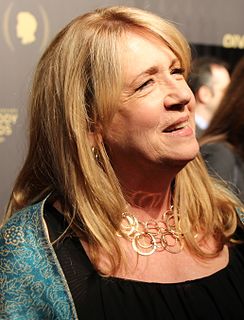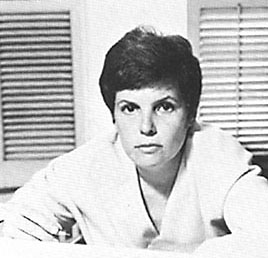A Quote by Ann Dowd
I was educated by nuns. None of them, of course, did anything resembling the actions of Lydia from The Handmaid's Tale, but they taught me a work ethic, that I had to toe the line, that I had to step up and do my work, and that we would stay until it was done, and that came from a devotion to making you the best person you can be. That's the take I have on Lydia. She knows her actions are firm and sometimes very harsh, but she also looks after them.
Related Quotes
She didn't care anymore... and she got no pleasure from the work she did, but she did it. Everything bored her. She found that when she didn't have a notebook it was hard for her to think. The thoughts came slowly, as though they had to squeeze through a tiny door to get to her, whereas when she wrote, they flowed out faster than she could put them down. She sat very stupidly with a blank mind until finall 'I feel different' came slowly to her mind. Yes, she thought, after a long pause. And then, after more time, 'Mean, I feel mean.
She had, without realizing it at the time, learned to follow Nick's gaze, learned to learn his lust...his desires remained memorized within her. She looked at the attractive women he would look at...She had become him: she longed for these women. But she was also herself, and so she despised them. She lusted after them, but she also wanted to beat them up. A rapist. She had become a rapist, driving to work in a car.
My grandmother, who picked cotton, and my mom, who picked cotton as a child - my grandmother had a work ethic. She had 13 children that she had to raise and ended up for a time moving into the projects, but because my grandmother had a work ethic, she didn't stay in the projects... that's not how she wanted to raise her children.
My mother was very passionate about life and she would do anything for us. And she had to fight alone to raise us. We never had a lot of money for extras or anything. She had to work six days a week, and then she would do breakfast, lunch and dinner. She was a super-woman! For me, I don't know how she did it with three kids.
She didn’t understand why it was happening,” he said. “I had to tell her she would die. Her social worker said I had to tell her. I had to tell her she would die, so I told her she was going to heaven. She asked if I would be there, and I said that I would not, not yet. But eventually, she said, and I promised that yes, of course, very soon. And I told her that in the meantime we had great family up there that would take care of her. And she asked me when I would be there, and I told her soon. Twenty-two years ago.
Ever argue with a female and, in the middle of the argument, you no longer feel safe because of her actions? She may start pacing back and forth real fast, breathing out her nose. You know what my girl do? When she get mad, she start talking in the third person. That's scary as hell because that's her way of telling me that from this point on, she is not responsible for none of her actions.
At that moment a very good thing was happening to her. Four good things had happened to her, in fact, since she came to Misselthwaite Manor. She had felt as if she had understood a robin and that he had understood her; she had run in the wind until her blood had grown warm; she had been healthily hungry for the first time in her life; and she had found out what it was to be sorry for someone.
The first time I ever saw Lydia Lunch perform it was a religious experience. Not only is she intelligent and beautiful but she actually understands how "my" brain works. This almost rivals my first concert- Cindy Lauper when I was 12. She was so fascinating to me at the time. She made me want to dye my hair pink and start a band. (SO I naturally did)... All Cure records have had a great effect on me musically also.
Day and night she had drudged and struggled and thrown her soul into her work, and there was not much of her left over for anything else. Being human, she suffered from this lack and did what she could to make up for it. If she passed the evening bent over a table in the library and later declared that she had spent that time playing cards, it was as though she had managed to do both those things. Through the lies, she lived vicariously. The lies doubled the little of her existence that was left over from work and augmented the little rag end of her personal life.
The girl had a certain nobleness of imagination, which rendered her a good many services and played her a great many tricks. She spent half her time in thinking of beauty, bravery, magnanimity; she had a fixed determination to regard the world as a place of brightness, of free expansion, of irresistible action, she thought it would be detestable to be afraid or ashamed. She had an infinite hope that she would never do anything wrong. She had resented so strongly, after discovering them, her mere errors of feeling.
She was unaware that she was somewhat of a celebrity up in heaven. I had told people about her, what she did, how she observed moments of silence up and down the city and wrote small individual prayers in her journal, and the story had travelled so quickly that women lined up to know she had found where they’d been killed. She had fans in heaven..... Meanwhile, for us, she was doing important work, work that most people on Earth were too frightened even too contemplate.
although she went home that night feeling happier than she had ever been in her short life, she did not confuse the golf course party with a good party, and she did not tell herself she had a pleasant time. it had been, she felt, a dumb event preceded by excellent invitations. what frankie did that was unusual was to imagine herself in control. the drinks, the clothes, the instructions, the food (there had been none), the location, everything. she asked herself: if i were in charge, how could i have done it better?




































